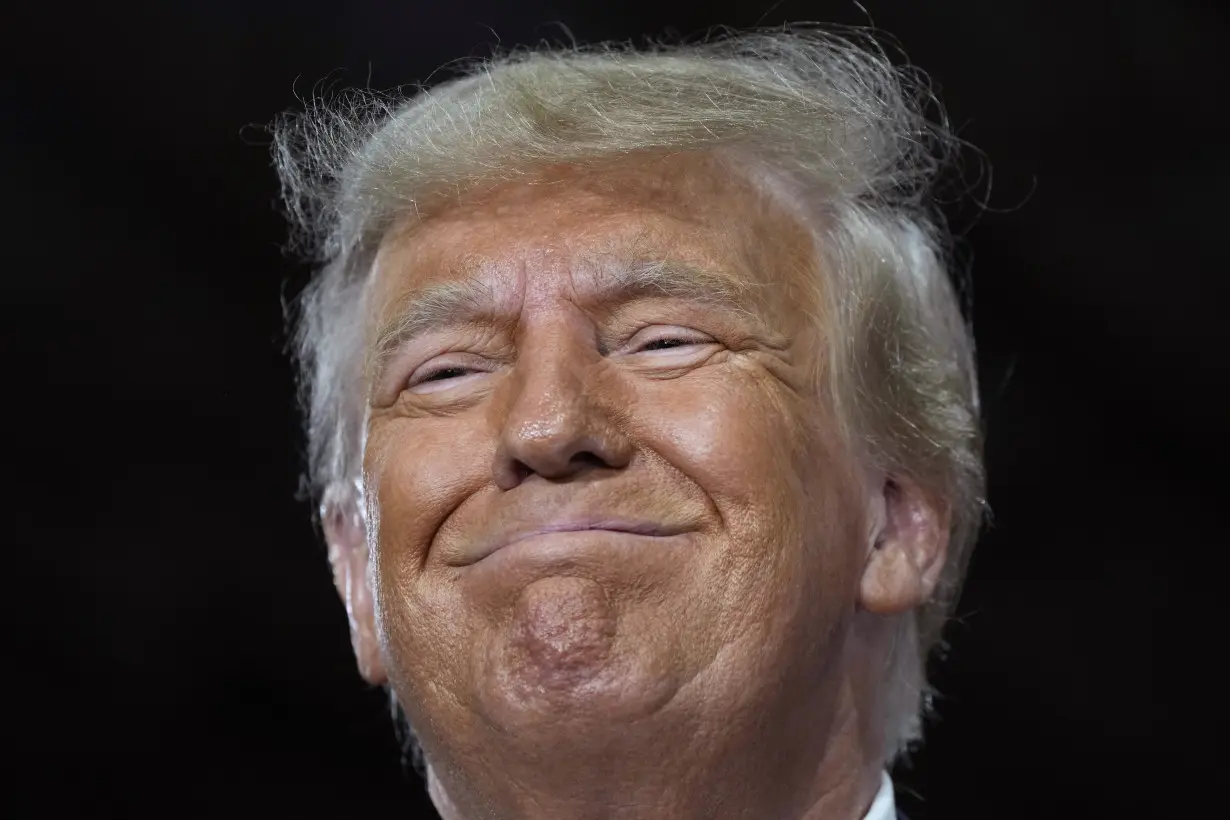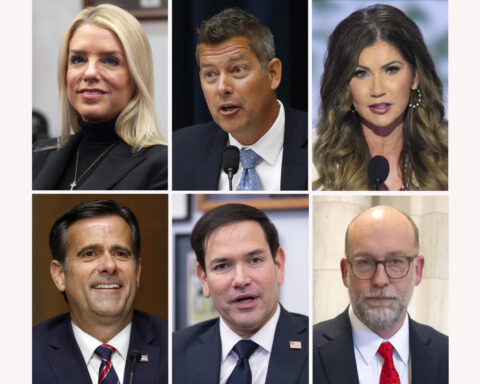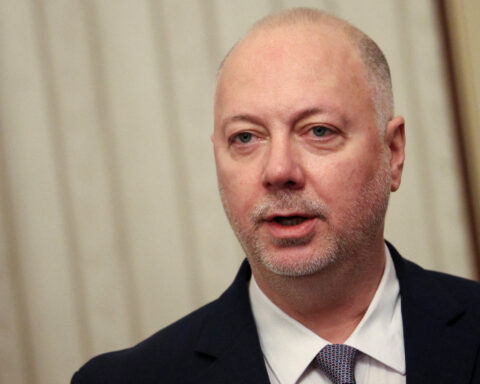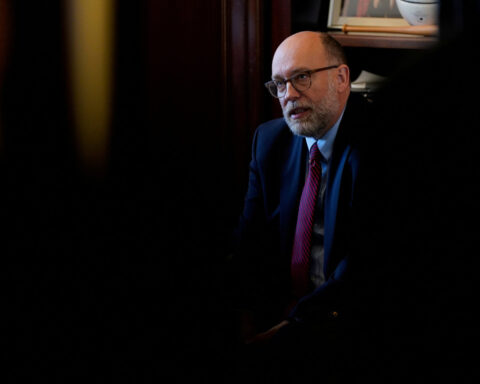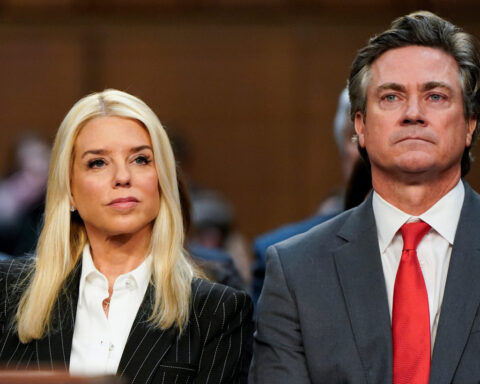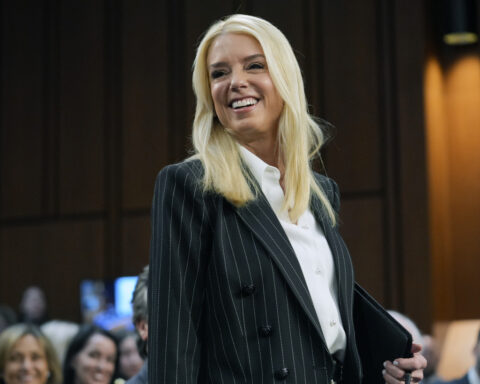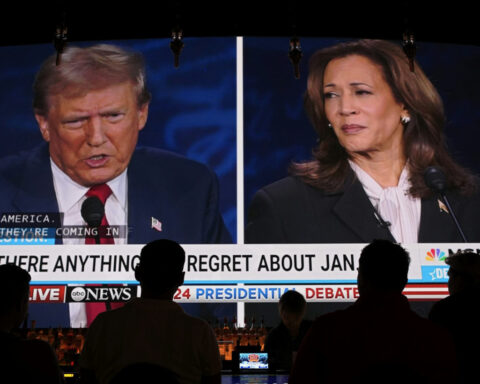WASHINGTON (AP) — Donald Trump is crushing his Republican presidential rivals in the contest to raise campaign cash, putting the other White House hopefuls in an unenviable position before the first votes are cast in January.
Those who have amassed a nest egg will have the resources to last for the foreseeable future, while those without will face hard choices in the coming days, weeks and months.
Here are some takeaways from the recently released campaign finance disclosures that cover the third quarter:
Trump's political operation has splurged at least $20 million this year on legal expenses arising from a sprawling set of court cases and lawsuits faced by the former president and his allies. It's an enormous outlay of cash, big enough to sink even a generously financed campaign.
Yet as the GOP presidential primary enters a crucial make-or-break phase before voting begins early next year, the latest campaign finance disclosures show Trump still has more money socked away than his top rivals — combined.
The amount of cash a candidate has in reserve offers a window into the health of their campaign. Those with an ample sum will have the money needed to hold events, run TV ads and communicate with voters. Those who lack it are all but certain to struggle.
But the stark disparity between Trump, whose presidential campaign had $37.5 million at the end of September, and the balances held by his rivals like former U.N. ambassador Nikki Haley, Florida Gov. Ron DeSantis and South Carolina Sen. Tim Scott speaks to a broader reality in the race: It's Trump's to lose and his rivals have both limited time and limited means to change that.
The drop-off from Trump is steep. That's led some candidates to send repeated and at times desperate-sounding pleas.
“Did you know that every new member who donates to Team DeSantis gets their own bumper sticker as a welcome present? Chip in $5 or more today,” read one text message solicitation sent last month.
Tim Scott was in an enviable position when he entered the Republican presidential contest, boasting of a $21.9 million war chest amassed over the years from his prominent perch in the Senate.
Things were less rosy for Haley, his home state rival. The one-time accountant raised $8.3 million last April, but relied on accounting gimmicks to inaccurately inflate her fundraising success by several million dollars in a press release.
Now the tables have turned.
Haley entered October with somewhat of a fundraising tailwind after doubling the money in her campaign account to $11.5 million over the past three months, thanks in part to strong debate performances that led to a flood of contributions.
Scott, meanwhile, has so far failed to catch on while hemorrhaging cash. That includes $14 million spent on advertising, according to data from advertising tracking firm Ad Impact. And he held $13.3 million at the end or September — down from $21 million at the start of the quarter.
The big spending super PAC that supports him — a group that can raise and spend unlimited sums, so long as they do not coordinate with Scott — also cancelled tens of millions of dollars in TV reservations planned for the fall.
Like Scott, DeSantis has also blown through a prodigious amount of money. The Florida governor entered the race with sky-high expectations and a $20 million pile of cash.
But his campaign, which was built out to convey the image of a front-runner, soon bowed to reality. DeSantis trimmed staff and expenses after burning through $8 million during an early six-week spending spree that included more than 100 paid staffers, a large security detail and luxury travel.
While he has continued to raise respectable sums, he is still spending almost as much as he takes in. That left him with $12.3 million at the end of the quarter.
One variable is his super PAC, Never Back Down, which DeSantis' political operation seeded with money left over from his 2022 gubernatorial campaign. The group won't have to disclose its finances until later.
Mike Pence was always going to face an uphill climb in a Republican presidential contest dominated by Trump, the man whom he served as a loyal vice president for four years.
His dismal fundraising has not helped.
Pence entered October running on fumes with $1.1 million cash on hand and debts of $621,000. That's after Pence, who is not independently wealthy, lent $150,000 of his own money to the campaign in July, records show.
The rate at which he has burned through cash is not sustainable absent a large infusion of cash. Though Pence raised about $4.5 million since entering the race, he has spent $3.4 million.
His expenditures offer a glimpse of a campaign flying low to the ground. Postage and printing was his biggest expenditure, costing $1.4 million. Travel cost him $207,000. Advertising and media production — what well-financed campaigns rely on to get their message out — accounted for about $80,000, records show.
It hasn't been all bad for Pence, who had a couple buzzy moments at a GOP debate in August. They came at the expense of Vivek Ramaswamy, a 38-year-old biotech financier and conservative ingenue whose critiques of “woke” politics have garnered attention.
“Now is not the time for on-the-job training. We don't need to bring in a rookie,” Pence said during one memorable exchange.
The difficulty for Pence is that it is a steep climb for him to reach the next debate stage. The Republican National Committee uses a candidates' ability to raise money from grassroots donors as a metric for qualifying — and it raised the thresholds for the next one.
While the Republican field of contenders crow about raising $10 million or $20 million, President Joe Biden has repeatedly touted totals that are far greater, like the $71 million his campaign says he has taken in since July.
Welcome to one of the advantages of incumbency.
As the leader of his party, Biden is able to rake in massive amounts through a joint fundraising agreement with the Democratic National Committee and all 50 state party committees. Under that arrangement, a single donor can stroke a check for nearly $1 million.
Republicans vying for the GOP nod, meanwhile, are on their own without this strategic advantage. Under federal campaign finance laws, their donations are capped at $3,300 per donor for the primary, though that will change once a nominee is selected and they can raise money in concert with the party.

 Insurance for natural disasters is failing homeowners − I don’t have the answers, but I do know the right questions to ask
Insurance for natural disasters is failing homeowners − I don’t have the answers, but I do know the right questions to ask
 Joe Biden’s record on science and tech: Investments and regulation for vaccines, broadband, microchips and AI
Joe Biden’s record on science and tech: Investments and regulation for vaccines, broadband, microchips and AI
 Meta shift from fact-checking to crowdsourcing spotlights competing approaches in fight against misinformation and hate speech
Meta shift from fact-checking to crowdsourcing spotlights competing approaches in fight against misinformation and hate speech
 Hope and dread as Israelis and Palestinians await a Gaza truce that may not end their suffering
Hope and dread as Israelis and Palestinians await a Gaza truce that may not end their suffering
 In eyeing Greenland, Trump is echoing long-held American designs on the Arctic expanse
In eyeing Greenland, Trump is echoing long-held American designs on the Arctic expanse
 When Sylvester Stallone’s French dubbing artist died, AI recreated his voice. His daughter is not happy
When Sylvester Stallone’s French dubbing artist died, AI recreated his voice. His daughter is not happy
 'It's not good enough.' Sidney Crosby, Evgeni Malkin and the Penguins are floundering at midseason
'It's not good enough.' Sidney Crosby, Evgeni Malkin and the Penguins are floundering at midseason
 Jayden Daniels accomplishes a feat last done by Slinging Sammy Baugh in 1937
Jayden Daniels accomplishes a feat last done by Slinging Sammy Baugh in 1937
 Wildfires latest: A final round of dangerous fire weather and dry conditions is in the forecast
Wildfires latest: A final round of dangerous fire weather and dry conditions is in the forecast
